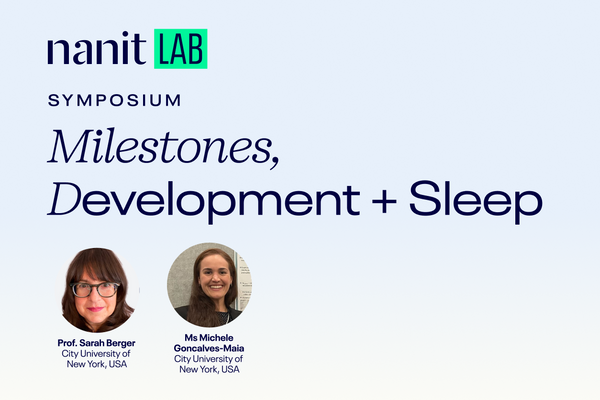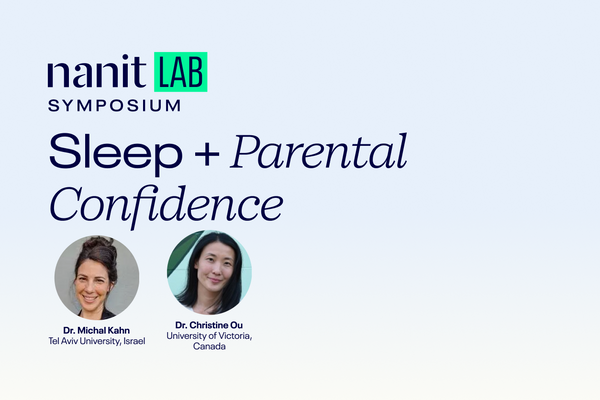Several studies presented during Nanit Lab’s 2024 Symposium focused on one key principle: Babies who have the skills to fall asleep on their own sleep longer and better than babies who fall asleep with a lot of caregiver help. So how do you help your baby develop those skills? Read on for data-driven advice!
How Sleep Influences Emotions
Who: Dr. Maria Breda, Sapienza University of Rome, Italy
Topic: Sleep and temperament: a relationship that starts in infancy
Gist: Dr. Breda’s study looked at the connection between a child’s temperament (whether they were more easygoing, cheery, extroverted or more irritable, anxious, upset) and the quality of their sleep. Nanit cameras were used to examine sleep behaviors and patterns. Parents also weighed in via questionnaires. The study included 600 infants and sleep data from over 4,000 nights.
Top 3 Takeaways:
- Lower sleep quality (less sleep, more active sleep cycles, and more wake-ups during the night) was associated with increased irritability and a decrease in the ability to self-regulate.
- More active physical bedtime and during-the-night comforting from caregivers (rocking, hand holding, breastfeeding or bottle feeding) appeared to be associated with lower quality sleep and more irritability.
- Infants with the ability to go to sleep on their own tended to sleep better and longer overall, which is associated with decreased irritability.
Creating an Independent Sleeper
Who: Dr. Aly Suh, Sungshin Women's University, South Korea
Topic: Insights from a psychological intervention to change the way you think about your child’s sleep to sleep more and better
Gist: Dr. Suh’s study explored the idea that how parents think and feel about their child’s sleep may influence how parents help their children at bedtime and during the night. These actions may also affect the quality of a child’s sleep. The research followed 38 children, aged 6 months to 24 months, and compared Nanit sleep data to parents’ feedback on a survey.
Top 3 Takeaways:
- Parents in South Korea and some other Eastern countries are less likely to use Behavioral Sleep Interventions (methods that help a child learn how to self-soothe) than parents in Western countries.
- Worrying about how sleep interventions (or sleep training) might affect a child could cause parents to act in ways that inadvertently interfere with their child’s sleep.
- Helping to educate parents about children and sleep can help children and their parents sleep longer and better.
An Ounce of Intervention
Who: Dr. Liat Tikotzky, Ben Gurion University, Israel
Topic: Employing the 'Nanit' system for studying the effectiveness of behavioral sleep intervention in infants
Gist: Dr. Tikotzky’s study examined the effects of parental involvement when infants have trouble going to sleep at bedtime and wake up during the night. Researchers used Nanit data and video footage to see how babies’ sleep behaviors changed in relation to parents’ visits and different types of interventions.
Top 3 Takeaways:
- Babies learned to settle down and fall asleep on their own.
- For parents who are trying to help their baby learn to self soothe, it helps to stay consistent with the level of interaction (for example, visiting the crib, but not taking the baby out of the crib).
- A video monitor can be a great resource and comfort in helping parents and researchers see a baby’s progress as they’re learning something new, like how to self soothe.
New Daily Mantra: It may take some time, but my child can learn to fall asleep on their own.
Falling asleep independently is a valuable skill, one that will help your baby sleep better and longer—which means you sleep better and longer too! There are many ways to help your little one learn how–choose what feels right to your family and remember that consistency is key.
Nanit’s monitors and Insights app can also help; letting you track and understand your baby’s sleep patterns and behaviors and offering you personalized tips. Nanit can also help you pinpoint which sleep training methods may work best for your family. Be patient and open to different ideas, and eventually, you’ll all be sleeping soundly!









































